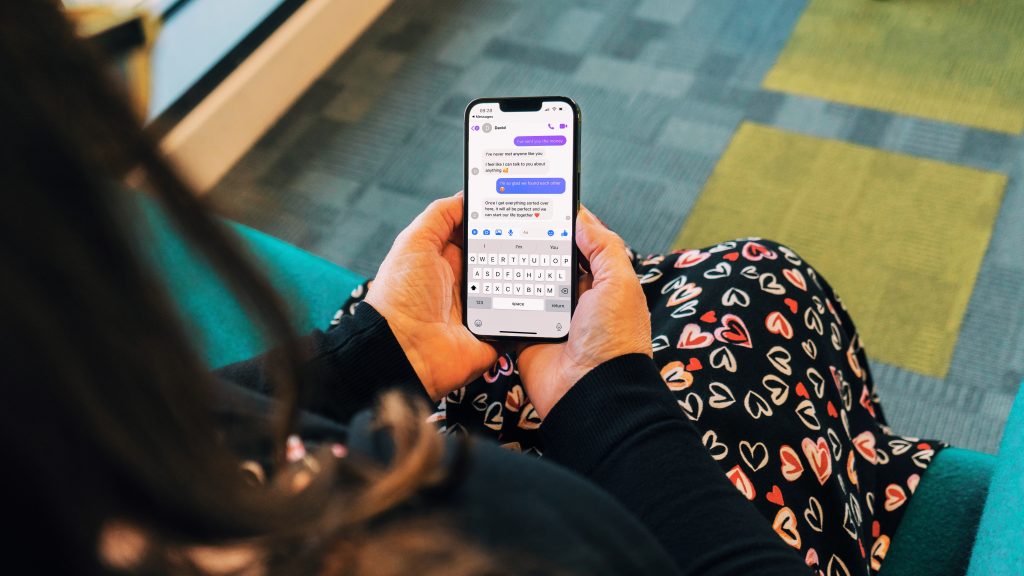Mother-of-three Mary-Anne*, of Middlesbrough, thought she had a lot in common with her partner.
He contacted her via Facebook messenger and explained how, like her, he was a widower.
She was feeling lonely at the time and thought David**, 64, would be “another person to chat to” when she was online.
Mary-Anne, 69, looked at his profile, added him as a friend and the pair started to message each other most days.
Before long, David asked Mary-Anne to move their messages from Facebook to What’s App and Google Chat. He even called using facetime.
As David’s details came up as Michigan, where he said he lived, Mary-Anne felt she had no reason to worry that David wasn’t telling the truth about himself.
She also got pictures of him working on an oil rig, where he said he was a contractor with a number of employees.
Just over two months into the relationship, David started to tell Mary-Anne that he was having financial troubles and couldn’t pay his 15-year-old daughter’s boarding school fees.
Mary-Anne deposited £1,500 in a holding account, which she believed would be forwarded to David’s daughter’s school.
David told Mary-Anne that he was in love with her and had never bonded with anyone after his wife died in childbirth – until he met Mary-Anne.

Requests came thick and fast…
Then, the requests for cash started to come thick and fast– as did the excuses why he needed it. They included:
- An accident on the rig, which had left him needing expensive medical treatment
- Specialist food orders to help with an existing stomach complaint
- Repairs, which were needed on a piece of industrial machinery
- An extended period on the rig caused by a freak storm, during which payment on the contract was delayed
- A street robbery, which saw David losing cash given to him for air fares and left a companion hospitalised.
Every time Mary-Anne said she didn’t have the money, he became very defensive and professed his love for her.
As a result, she continued to send money mainly in the form of shopping vouchers, which would be difficult to trace.
The crunch came when David allegedly sent a courier to Britain with cash to re-pay his debts.
Mary-Anne got a What’s App message, allegedly from a UK airport, demanding £300 for customs to release the courier and the cash.
At this point, Mary-Anne’s grandson intervened and showed her on the telephone that the courier and David were the same person.
That’s when Mary-Anne cut contact with David – and got in contact with the PCC-funded Victims Care and Advice Service (VCAS.)
The relationship cost Mary-Anne £10K in just seven months – most of which she hasn’t been able to get back.
Rachel Graham, VCAS’ Fraud Victims Advocate, managed to reclaim £2,700 from Mary-Anne’s bank. However, most of the cash isn’t so easy to trace and reclaim.
Mary-Anne borrowed money from friends and on credit cards. She even sold her possessions and pawned jewellery of great sentimental value so she could send David money.
Mary-Anne has now entered into a payment plan with her bank as part of an Individual Voluntary Arrangement (IVA ) to pay off all or part of her debts.
She said: “I never, ever thought that I would fall for something like this. I feel pathetic. I cared for him and he made me fall in love with him.”
Mary-Anne is now re-building her life with the help of her VCAS Victim Care Officer Emma Atkinson.
Emma said: “People should be wary if anyone wants to move your chat to another channel which does not have the same terms and conditions as the original platform.
“Don’t feel stupid if this happens to you as these people have spent months manipulating before they start to ask for money.
“And never give money – or your bank details – to anyone you don’t know.”
If you have been the victim of fraud, contact VCAS on (01642) 664 440 for help and support.
*Not her real name
**Not his real name

